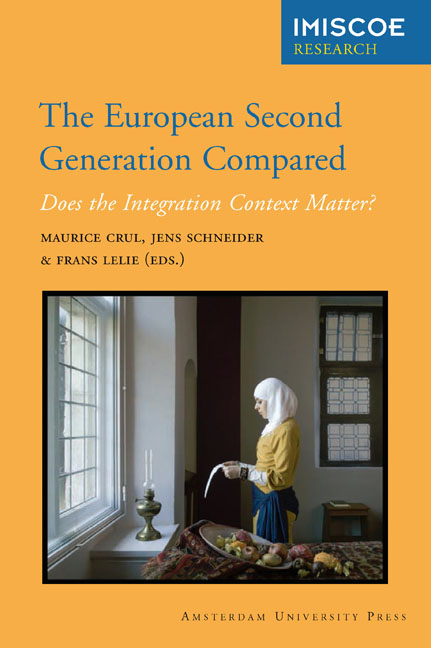Book contents
- Frontmatter
- Contents
- Acknowledgements
- 1 Introduction
- 2 Comparative Integration Context Theory: Participation and Belonging in Diverse European Cities
- 3 Research Methodology
- 4 The TIES Respondents and their Parents: Background Socio-Demographic Characteristics
- 5 School Careers Of Second-Generation Youth in Europe: Which Education Systems Provide the best Chances for Success?
- 6 Assessing the Labour Market Position and Its Determinants for the Second Generation
- 7 Union Formation and Partner Choice
- 8 Identities: Urban Belonging and Intercultural Relations
- 9 Ways of ‘being Muslim’: Religious Identities of Second-Generation Turks
- 10 Conclusions and Implications: The Integration Context Matters
- List of Contributors
- Other IMISCOE titles
5 - School Careers Of Second-Generation Youth in Europe: Which Education Systems Provide the best Chances for Success?
Published online by Cambridge University Press: 09 January 2021
- Frontmatter
- Contents
- Acknowledgements
- 1 Introduction
- 2 Comparative Integration Context Theory: Participation and Belonging in Diverse European Cities
- 3 Research Methodology
- 4 The TIES Respondents and their Parents: Background Socio-Demographic Characteristics
- 5 School Careers Of Second-Generation Youth in Europe: Which Education Systems Provide the best Chances for Success?
- 6 Assessing the Labour Market Position and Its Determinants for the Second Generation
- 7 Union Formation and Partner Choice
- 8 Identities: Urban Belonging and Intercultural Relations
- 9 Ways of ‘being Muslim’: Religious Identities of Second-Generation Turks
- 10 Conclusions and Implications: The Integration Context Matters
- List of Contributors
- Other IMISCOE titles
Summary
Introduction
We begin this chapter with some profiles of respondents to the TIES survey, namely, three young women of Turkish descent living in Paris, Frankfurt and Amsterdam. The women's parents all came from small villages in the countryside of Yozgat, a province in central Turkey, which is a major sending area for Turkish emigrants. The mothers had all gone only to primary school, while the fathers each had attended an additional few years of secondary school. These stories exemplify differences in school careers for young second-generation Turkish women in the different European cities we studied.
First there is Kaya, an unmarried Turkish-French woman who was 22 years old at the time of the TIES survey in France. Living in Paris, at age three, she went to école maternelle, followed by the local primary school where, according to her estimation, half the children came from immigrant families. She never had to repeat a year and, at age eleven, continued on to a collège, a lower secondary school, in her neighbourhood. In this school, three quarters of the children were of immigrant descent. Again, she did not have to repeat years and obtained her BEPC diploma, after which she continued in the first year of a lyceum technologique, an upper secondary school. At age seventeen, she received her baccalaureate degree and then moved on to a higher vocational education institution where, at age 21, she got her Bachelor's degree. At that point, Kaya stopped her studies because, as she put it, she was satisfied with her results. Upon leaving school, she was first unemployed, though after eight months she found a professional job as a social worker. Kaya represents a large group of female respondents of Turkish descent in our Paris survey.
Turning to Frankfurt, we meet Aysa, a Turkish-German twenty year old at the time of the TIES survey in Germany. Aysa did not go to Kindergarten and so only began school at age six. She went to a neighbourhood primary school in which about three quarters of the children were from immigrant families. She repeated a year once and thus finished primary school at age eleven.
- Type
- Chapter
- Information
- European Second Generation ComparedDoes the Integration Context Matter?, pp. 101 - 164Publisher: Amsterdam University PressPrint publication year: 2013
- 4
- Cited by



